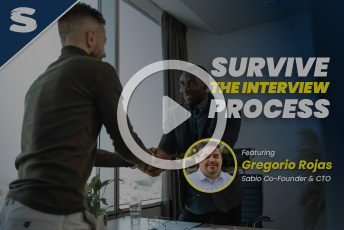Now Reading
Imposter Syndrome: How to Survive the Interview Process
Monday, December 6, 2021
Feeling trapped by your own experience? Here are the simple cures for Imposter Syndrome during the job interview process.
Feeling trapped by your own experience? Here are the simple cures for Imposter Syndrome during the job interview process.
Hello, my name is Gregorio Rojas, I am one of the co founders and head instructor at Sabio, a developer bootcamp based out of Los Angeles in Irvine, California. This is video two of a short series of videos discussing imposter syndrome and how to inoculate yourself against it. And how do you inoculate yourself against imposter syndrome? You do so with question to asking questions at the time at the point in time where it might be most difficult and seem scariest to ask questions. So here, I'm going to give you a story that is about one of our fellows who went out into the job market and engaged in the interview process. If you've never been through the interview process, becoming a software developer of getting a new job as a software developer, I can tell that the interview process can be quite challenging, because it's very technical. And people expect you to perform at a very high level in the scenarios. And so one of our women developers went out and, you know, security and interview at a company here in Los Angeles. And they found themselves sitting across the table from a hiring manager, technical hiring manager that was asking them, you know, again, very challenging questions. And one of the things, you know, a lot of commentary coming from this individual, in response to her questions, and evolved from a, you know, your regular, standard, challenging, technical interview into what I will describe as she started getting beat up and tongue lashed by this individual. Why does someone do that? How Why does someone conduct themselves in that way an interview process is something I will never know. You know, you don't need to take an opportunity where someone is being, you know, judged, right. And this is one of the reasons why imposter syndrome is gonna really surface itself often in the interview process, because you very clearly are being judged. Are you good enough for this job, there's no need to turn that into, you know, basically some type of torture in beating up the other person on the other side of the table, but it happens. And so what was happening to this developer? Is that, you know, she just kept getting beat up about how dare you walk in here without a computer science degree, you have no business being here, you don't have a computer science degree, you don't have a background in software development, why would you come into this room, you should, in fact, I remember she told me, she, the guy told her, the interviewer told her that she should stop her job. And she should go get a proper education in computer science, before she continued, because it didn't make sense for her to do so. And so this is really tough to hear. I was really hurt by it. I was hurt for her. I was upset, I was angry. And, you know, this is me being removed from the whole situation, I was very emotional about the whole thing. And you could imagine how strongly she felt about what had happened to her. And in the moment, somehow, I don't know where she gets the the strength really. And the wherewithal to ask a really important question. She asked this individual. Okay, look, Well, where did you get your computer science degree from? Right. And that's an actual, I think that would be an actual question. But in the moment, like, I don't know, if I could have asked that question myself. You know, you're getting beat up and go and get a computer science degree and you guys just what you should do? And she asked the question, Well, where did you get your computer science degree from? You know, maybe I want to go get it there. Because you happen to think it's so important. Well, the answer was a little shocking, actually. Shocking, but not surprising. He didn't have his computer science degree. Right. And so when you hear that, what I felt was that you know, what, you have no legs to stand on, buddy. Like, how dare you, you know, chastise this individual for not having computer science degree and mandate that they go and get a computer science degree when you yourself don't have one. Right? And so empowering yourself with that knowledge that that person she's got no legs to stand on. They they're speaking from no position of authority at all, right, because they themselves don't have a computer science degree. And they yet they are. They're a technical person, a technical hiring manager, putting these restrictions upon someone else. Right, that don't make sense. So the end of the story, though, has a really good ending. The interview ended naturally, you went into it, they're not going to give him a call back. This is like insane. I'm not going to go to work there and you clearly don't want me there. Anyway, but two weeks later, a number of weeks later, she was still looking for work. In fact, she was about to accept an offer or hadn't had an offer come in already. For another place when the recruiter called her back and said, Hey, look, that guy he actually wants to extend an offer to you, he wants to hire you. Because it turns out that after weeks and weeks of more search of interviewing more people, like they couldn't find anyone better than her. And so I can't imagine the guy having to come back to her and and say that to her, they say like, Well, I'm gonna give you an offer. Naturally, she did not take it, she took a better offer than what was offered by this individual obviously not a good place to go war for that guy already showed us colors. But they're gonna have to come back and give her her job offer. Right and so, you know, putting yourself out there to go interview, putting yourself out there somehow ask that tough question. In the middle of that process. You learn a lot, right? And you learn a lot that allows you to move forward in your career knowing that you know what, you can definitely you definitely belong in the room. And the people that are sometimes judging you, they have no place to judge you, you got to look in you know, it's like they say you're the best, you're the person that's gonna make yourself feel good. You're the person that is going to be in charge of how you feel. So do that. Take take control and take responsibility for that by asking these tough questions. Okay, next video, another story. Leave anything is possible. When you come here you want to stay
During our Info Sessions you will learn all about our program, and also get to speak with Sabio team members. In addition, every week you get to hear directly from recent grads that are now thriving in tech.







